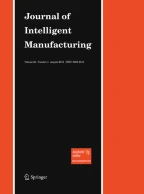Abstract
Collaborative design is a common practice in modern product development. Companies specializing in different disciplines, which are often geographically separated, work together to develop solutions for the benefit of overall design. In such inter-organizational collaboration, participants hiding individual skills and design rationales is highly desirable. To fulfill this requirement, this study proposes a negotiation mechanism based on a price schedules decomposition algorithm originally developed in economics. The mechanism searches for globally optimal designs, where no participant is necessary to own full knowledge of the entire design space. This paper also applies multi-agent system technologies to realize a secure environment for automating distributed collaborative design. A test scenario of distributed tolerance allocation in assembly design validates the proposed mechanism.
Similar content being viewed by others
References
Baumol W. J., Fabian T. (1964) Decomposition, pricing for decentralization and external economics. Management Science 11: 1–32
Chu C. H., Chang C. J., Cheng H. C. (2006) Empirical studies on inter-organizational collaborative product development. ASME Journal of Computing & Information Science in Engineering 6(2): 179–187
Chun W. H., Wong R. Y. M. (2003) N*: An agent-based negotiation algorithm for dynamic scheduling and rescheduling. Advanced Engineering Informatics 17: 1–22
Cooper S., Taleb-Bendiab A. (1998) CONCENSUS: Multi-party negotiation support for conflict resolution in concurrent engineering design. Journal of Intelligent Manufacturing 9: 155–159
Ganguly S., Wu T., Blackhurst J. (2008) A price-based negotiation mechanism for distributed collaborative design. IEEE Transactions on Engineering Management 55(3): 496–507
Gulliver P. H. (1979) Disputes and negotiations: A cross-cultural perspective. Academic Press, New York
Jennergren L. P. (1973) A price schedules decomposition algorithm for linear programming problems. Econometrica 41: 965–980
Jiao J., You X., Kumar A. (2006) An agent-based framework for collaborative negotiation in the global manufacturing supply chain network. Robotics & CIM 22: 239–255
Jin Y., Geslin M. (2010) A study of argumentation based negotiation in collaborative engineering design. International Journal of Artificial Intelligence for Design, Analysis, and Manufacturing (AIEDAM) 24: 35–48
Jin Y., Lu S. C. Y. (1998) An agent supported approach to collaborative design. Annals of the CIRP 47(1): 107–110
Kraus S. (2001) Strategic negotiation in multiagent environments, a Bradford book. Massachusetts Institute of Technology, Cambridge, MA
Li J., Zhang H. C., Lin Z. (2009) Asymmetric negotiation based collaborative product design for component reuse in disparate products. Computers & Industrial Engineering 57: 80–90
Lottaza C., Smith I. F. C., Robert-Nicoudb Y., Faltings B. V. (2000) Constraint-based support for negotiation in collaborative design. Artificial Intelligence in Engineering 14(3): 261–280
Lu, S.C.-Y., (2005). Engineering collaboration via negotiation. CIRP ECN-WG Special Workshop, Shanghai, China.
Nwana H. S. (1996) Software agents: An overview. Knowledge Engineering Review 11(3): 205–244
Parsons S., Sierra C., Jennings N. R. (1998) Agents that reason and negotiate by arguing. Journal of Logic and Computation 8/3: 261–292
Pruitt D. G. (1981) Negotiation behaviour. Academic Press, New York
Rahwan I., Ramchurn S. D., Jennings N. R., McBurney P., Parsons S., Sonenberg S. (2003) Argumentation-based negotiation. The Knowledge Engineering Review 18(4): 343–375
Raiffa H., Richardson J., Metcalfe D. (2002) Negotiation analysis: The science and art of collaborative decision making. The Belknap Press of Harvard University Press, Cambridge
Ronsenschein J., Zlotkin G. (1994) Rules of encounter: Designing conventions for automated negotiation among computers. MIT Press, Cambridge
Shen W., Hao Q., Li W. (2008) Computer supported collaborative design: Retrospective and perspective. Computers in Industry 59(9): 855–862
Shiau, J. Y., & Li, X. (2009). Modeling the supply chain based on multi-agent conflicts. In IEEE international conference on service operations, logistics and informatics, Chicago, IL, USA, July 22–24, 2009.
Sycara K. P. (1989) Multiagent compromise via negotiation. In: Gasser L., Huhns M. (eds) Distributed artificial intelligence. Pitman, London, pp 119–137
Toulmin S. E. (1969) The uses of argument. Cambridge University Press, Cambridge
Tseng Y. J., Chen J. Y., Huang F. Y. (2010) A multi-plant assembly sequence planning model with integrated assembly sequence planning and plant assignment using GA. International Journal of Advanced Manufacturing Technology 40(1–4): 333–345
Author information
Authors and Affiliations
Corresponding author
Rights and permissions
About this article
Cite this article
Lin, YI., Chou, YW., Shiau, JY. et al. Multi-agent negotiation based on price schedules algorithm for distributed collaborative design. J Intell Manuf 24, 545–557 (2013). https://doi.org/10.1007/s10845-011-0609-2
Received:
Accepted:
Published:
Issue Date:
DOI: https://doi.org/10.1007/s10845-011-0609-2
